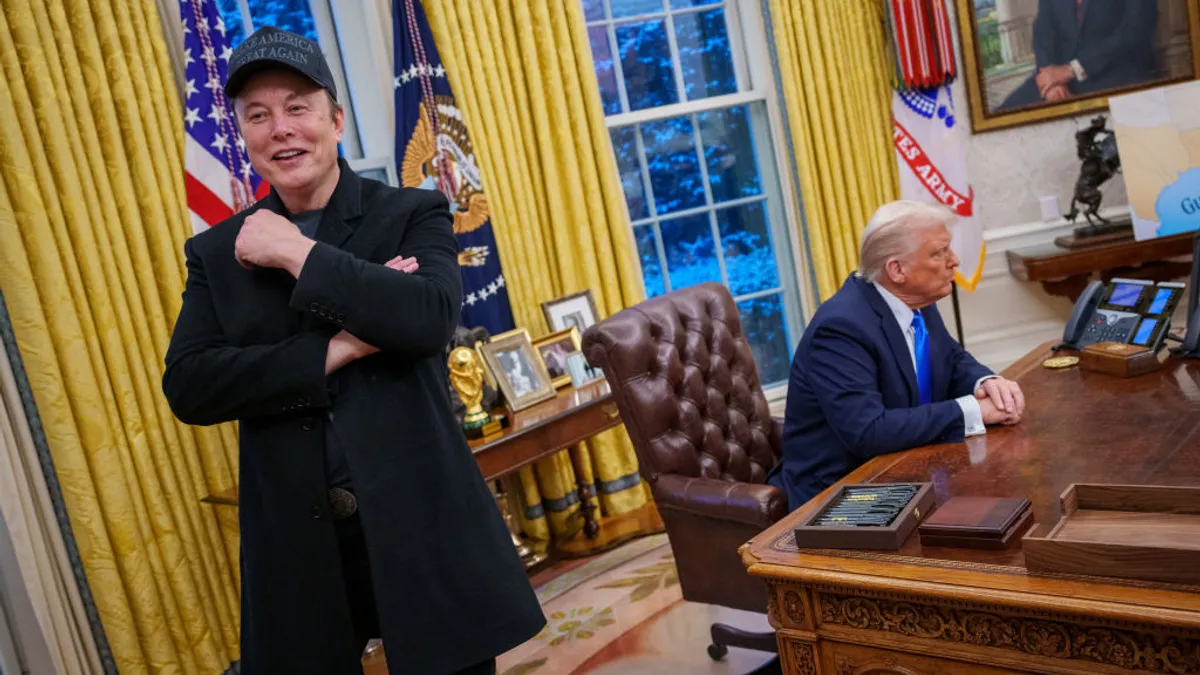UPDATE: Feb. 13, 2025: District Judge George O’ Toole declined to block the deferred resignation program for federal workers. The portal for the "Fork in the Road" directive on the Office of Personnel Management's website now reads, "The Deferred Resignation Program is now closed. Any resignations received after 7:20pmET, February 12, 2025 will not be accepted."
—
On Tuesday, while appearing alongside Department of Government Efficiency head Elon Musk in the Oval Office, President Donald Trump signed an executive order giving DOGE more power.
If confirmed following her Feb. 19 nomination hearing for secretary of labor, Lori Chavez-DeRemer and other agency heads “shall develop a data-driven plan, in consultation with its DOGE Team Lead, to ensure new career appointment hires are in highest-need areas,” the executive order said.
Additionally, agencies “shall not fill any vacancies for career appointments that the DOGE Team Lead assesses should not be filled, unless the Agency Head determines the positions should be filled.”
This is yet another installment in the battle between DOGE and federal agencies, not limited to but including the Department of Labor — and that battle is just one in the ongoing war between the president and his appointees, and the federal workforce.
The state of the U.S.’s biggest employer
On Monday, the Office of Inspector General for the U.S. Agency for International Development released a report on the impact of staffing reductions. Trump gave its inspector general the boot on Tuesday, according to media reports.
In the background, the alleged federal employee “deferred resignation” offer has loomed large over the past two weeks. On Monday, District Judge George O’ Toole granted a temporary restraining order delaying the period of decision for federal workers to accept the offer “until further order of the Court.”
Previously, the deadline was Feb. 6; federal workers’ unions challenged that offer. The American Federation of Government Employees; the American Federation of State, County and Municipal Employees; and the National Association of Government Employees led the push.
DOGE digs into the DOL, to workers’ chagrin
Likewise, AFGE and several other groups asked for a temporary restraining order against DOGE regarding its access to Labor Department data, naming DOL, DOL Acting Secretary Vince Micone, the U.S. Digital Service and DOGE as defendants.
The union alleged DOGE staff would “demand” access to DOL systems “that they are legally barred from” and that “they will fire any employee who protects the integrity of those systems,” the complaint read.
On Feb. 7, a federal judge ruled that DOGE could continue accessing the Department of Labor’s digital systems, saying that the unions could not prove sufficient harm had been caused.
The plaintiffs had claimed that DOGE personnel’s access to digital data would “harm millions of workers and their families” due to “unauthorized access to sensitive employee health and disability data.”
This ruling prompted Liz Shuler, president of the American Federation of Labor and Congress of Industrial Organizations, to issue a statement, in which she called Musk-led DOGE a “risk” to DOL’s integrity.
“Musk has a record of repeated violations of labor and employment laws resulting in numerous DOL investigations,” Shuler said. “But tonight, a court refused to block DOGE from seizing the information infrastructure of the very agency entrusted with protecting workers from bad employers like him.”
Shuler said that AFL-CIO and its allies would “renew our efforts to block DOGE from accessing sensitive data at DOL.”
Looking ahead, with DOGE’s impact in mind
The original plaintiffs in the anti-DOGE lawsuit renewed their efforts Tuesday — joined by Virginia Poverty Law Center, Economic Action Maryland Fund and the American Federation of Teachers — when they filed an amended complaint and new request for a temporary restraining order.
Added to the list of defendants are the Department of Health and Human Services, HHS Acting Secretary Dorothy Fink, the Consumer Financial Protection Bureau, and Russell Vought, the bureau’s acting director.
The complaint needles in on Musk, stating “DOGE will also have access to Department of Labor records concerning investigations of Mr. Musk’s businesses, as well as records containing the sensitive trade secrets of his business competitors, which are held by the Department of Labor and Consumer Financial Protection Bureau. No other business owner on the planet has access to this kind of information on his competitors, and for good reason.”
The new restraining order request notes DOGE’s access to HHS records, stating that the health agency “exposes personal and health information of Medicare and Medicaid beneficiaries, as well as personal information of the healthcare providers who care for them.” This access “also exposes the personnel information of HHS’ own employees, including those represented by Plaintiff AFGE, among many other kinds of sensitive personal and health information.”
Additionally, the plaintiffs alleged, DOGE has “access to sensitive personal information about individual consumers — whether from complaints the consumers submitted to the CFPB themselves, or from records obtained during Bureau investigations and examinations.”
The DOL is just one piece of the greater puzzle regarding Musk’s approach to government efficiency, which has targeted a number of agencies. (Just this past Friday, Musk made an X post saying “CFPB RIP”; by Sunday, the bureau’s workers were told to stay home this week.)
Detractors and supporters, including Musk himself, have taken note of the way DOGE is rewriting the script when it comes to federal funding, the hiring and firing of the federal workforce, and the future of worker privacy in the U.S.





















